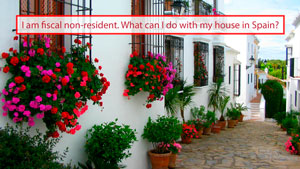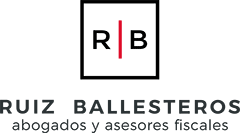These days, in which due to Covid-19 mobility between countries has been limited, we want to approach all those people who reside in another country, who have a property in Spain and who out of fear, respect or certain limitations do not intend to come for the moment to enjoy their properties.
Today, it is not necessary to attend to your tax obligations personally, but with the contact and support of a professional, you can have everything up to date in a telematic way.
Therefore, from Ruiz Ballesteros Lawyers and Tax Advisors we give you a brief summary of the main aspects and obligations that you must take into account.
We started first by clarifying the concept of Tax Residence:
It is understood that a natural person has his habitual residence in Spain when one of the following circumstances happens:
- Stay in Spain for more than 183 calendar days of the natural year.
- The main core or the basis of its economic activities or interests, directly or indirectly, take place in Spain.
- That their spouse and children lives in Spain.
To delve into this aspect of Tax Residence we recommend you read our article in this link: https://www.ruizballesteros.es/en/when-am-i-considered-to-be-a-tax-resident-in-spain/
Once the concept of Tax Residence has been clarified, all those persons who reside outside Spain and have property located in Spanish territory, will be considered as taxpayers of the Income Tax of Non-Residents (IRNR). The income derived from this immovable property located in Spain will be subject to taxation here, whether these come from the use or enjoyment directly or from the lease or any other form of exploitation of these.
What should I do if I have a property for my own use?
If the property is not rented but is dedicated to the use or enjoyment of the owner, not affecting economic activities, it will be subject to the IRNR for the corresponding imputed income.
How is that Indicted Income calculated?
Based on the regulations of the IRPF Law, the income charged will be the result of applying a percentage to the cadastral value of the property, value that can be found on the receipt of the Real Estate Tax (IBI), these calculations will be as follows:
- Property whose cadastral value has been revised or modified and has entered into force in the tax period or in the previous ten tax periods…………………………………………………. 1,1%
- Remaining properties………………………………………………………………………………………….… 2%
If the property has not been owned all year round, or has been rented part of it, it will be reduced in proportional part to the number of days. Likewise, if the same property is owned by several persons, each must be taxed by the percentage that corresponds to it.
This tax is accrued each year as of 31st December, and the filing period ends on the last day of the following year. The applicable rate of levy shall be the rate in force in the year of accrual, depending on their place of residence. Since 2016 this type of levy will be 19% for Residents of the European Union, Iceland or Norway, and will be 24% for other taxpayers.
What happens if I rent the property?
If you rent your property, please note that you must declare separately for each income you earn at the end of the quarter to which it corresponds. You must declare, in general, the entire income you receive from the lessee, excluding Value Added Tax.
If you are a fiscal resident of another Member State of the European Union or in a State of the European Economic Area with which there is an effective exchange of information, the total income received you could deduct the expenses provided for the Personal Income Tax Act (loan interest, repair and maintenance expenses, taxes, community expenses, insurance, supplies, property depreciation), provided that you can prove that these expenses are directly related to the income obtained in Spain and that you have a direct and inseparable economic link with the activity you carry out in Spain.
If the result of the quarter is to be entered, you must settle it within the first 20 calendar days of the month following the finalized quarter. If the result is zero, it must be settled within the first 20 calendar days of January of the following year. Therefore, it will be very important to review at the end of each quarter the returns obtained to avoid meeting the deadlines.
The applicable rate of levy shall be the rate in force in the year of accrual, depending on your place of residence. Since 2016 this type of levy will be 19% for Residents of the European Union, Iceland or Norway, and 24% for other taxpayers.
It is important to note that the rental activity of properties may be considered as a business activity if you have an employed person with a full-time employment contract.
Wealth tax
If the total value of the goods and rights you have in Spain as of 31st December exceeds the exempt minimum of 700.000 euros, you must settle the Estate Tax between April and June of the following year by filing The Model 714.
If it is not taxable to pay, but your Estate in Spain is more than 2.000.000 euros, you must also file this declaration.
In addition to the Non-Resident and Heritage Tax, remember to also keep up to date the payment of Municipal Taxes, such as the IBI and the garbage rate, which is settled every year in the summer months. If you are not domiciled, it is important to authorize someone to obtain the payment letter on your behalf, and even direct debit upcoming receipts.



 Español
Español Русский
Русский
